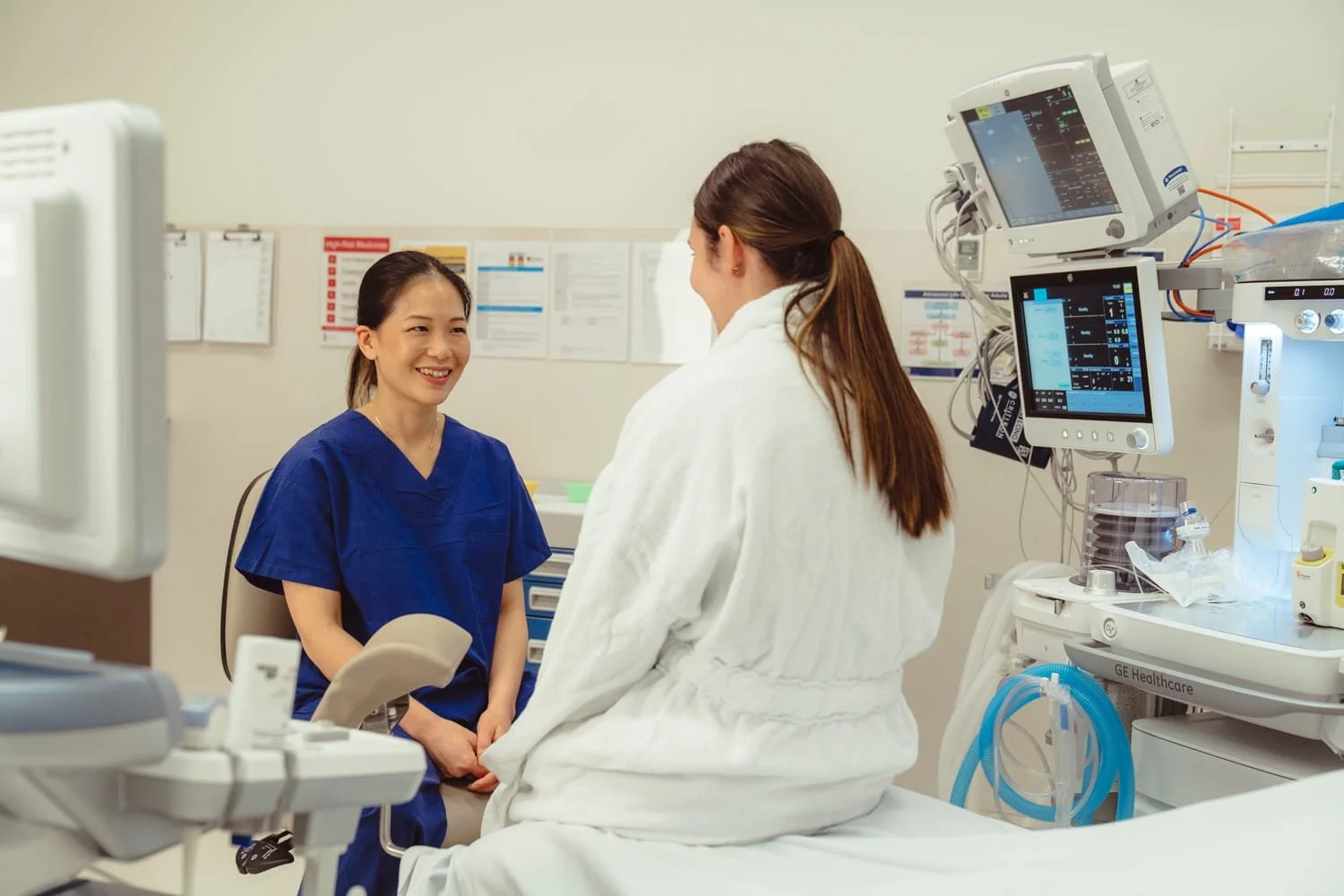Dr I-Ferne Tan: IVF Specialist Sydney
While it's one of the most common fertility treatments, IVF can feel overwhelming. Having the right specialist by your side makes all the difference.
📞 Call us (02) 9161 4189
About My Clinics
Each fertility clinic I work at is fitted with state-of-the-art facilities and equipment so that you're getting the best possible care and treatment. At each step of the process, I'll help you feel comfortable, safe, and confident about any procedures. My clinic is a safe space for everyone.
Understanding IVF Treatment
In vitro fertilization (IVF) involves fertilising eggs with sperm outside the body and then transferring the embryos into the uterus.
-
Ovarian Stimulation
Fertility medications are used to help the ovaries produce lots of mature eggs instead of the single egg typically released during a menstrual cycle.Egg Collection Procedure:
Once the eggs have reached maturity, they're collected using a minor surgical procedure. A trans-vaginal ultrasound guides the insertion of a thin needle into the ovaries to collect the eggs. It can be done while you’re awake (with local anaesthetic numbing injection) or asleep (under general anaesthetic).Sperm Collection:
Your partner's sperm is collected and prepared in the laboratory.Fertilisation:
The eggs and sperm are combined in a laboratory dish to facilitate fertilisation.Embryo Culture:
The resulting embryos are monitored in a special machine for 5 days.Embryo Transfer Procedure:
One embryo at a time is transferred into the woman's uterus for potential implantation. A long thin tube inserts into the uterus to place the little embryo in the perfect spot. It should not be a painful procedure.
-
Like with most fertility treatments, the success rates of IVF vary based on the woman's age, the quality of the eggs and sperm, the expertise of the fertility specialist, the technology and expertise of the scientists in the fertility clinic, and the underlying fertility issues.
Younger age, good ovarian reserve, and a healthy uterus tend to support better outcomes.
-
Like any medical procedure, fertility treatments come with potential risks and side effects. These can include hormonal reactions or procedural complications. We'll run through any considerations so you can make an informed decision.
Fertility Testing and Diagnosis
Not everyone who is struggling to conceive needs IVF. There are very few instances where IVF is the only option, and these are rare cases. So, it’s important to have a comprehensive assessment and consider all the possibilities.
📞 Call us (02) 9161 4189
Finding the Right Specialist - Why Me
-
Each clinic I work at features cutting-edge technology and facilities for innovative fertility care. When you work with me, you're getting the latest advancements in reproductive medicine.
-
My fertility career started after a negative experience as a patient myself. This journey can be intimidating, so I always bring compassion and empathy to the forefront. I see each patient's fertility holistically, taking a deeply personalised approach that accounts for your goals and values.
-
With locations in Crowns Nest, Lindfield, and Sydney CBD, I'll meet you at whichever clinic is most convenient for you.
FAQs
-
The success rate of IVF hangs on 3 factors: the fertility specialist, the fertility company, and the fertility factors (of which the biggest is female age).
In Australia, a woman under 35 has 48% chance of being pregnant after one complete round of IVF. This ranges from 17% to 66% depending on the above factors. A woman over 35 has a 26% chance of success on average.
I work with Genea Sydney for IVF treatment, who hold a 60% success rate (higher than the national average.)
-
The cost of IVF depends on the type of fertility treatment and the fertility company.
At Genea, a standard IVF cycle costs $12000. If you're eligible for Medicare, you can get a $6000 rebate.
Then there are “extra” services that also cost extra. Some are optional (e.g. preimplantation genetic testing) and some are required (e.g. ICSI - a process for male infertility).
-
Some people can have reactions to the hormone medication. Bloating, weight gain (temporary) and heightened emotions are common.
Nausea, pelvic cramps, or headaches can also be side effects.
The biggest risk of IVF is ovarian hyperstimulation (OHSS) where overproduction of eggs and hormones can lead to severe pain and complications such as blood clots, twisted ovaries, and problems with the kidneys, lungs or liver.
During the egg collection procedure, there is a small but potential risk of damage to your bowel or major blood vessels which can cause internal bleeding.
-
Make sure you have had an orientation and education session with a fertility nurse. They'll gear you with the required medicines, and then show you how to correctly use each one. Continue taking prenatal vitamins or folic acid in preparation for pregnancy.
Otherwise, there is nothing special. You can continue eating all your usual foods and continue your usual activities, including work and exercise.
Mindfulness and gratitude practices may help alleviate some of the stress associated with IVF treatment.
-
Once you start treatment, it takes approximately 3 weeks.
During this time, you will have blood tests and ultrasounds every few days to monitor your hormone levels and the growth of the follicles on your ovaries. The egg collection is a day surgery procedure that takes approximately 20 minutes. Embryo transfer happens 5 days later. This procedure takes approximately 5 minutes.
CONTACT US
Let’s chat
Book a consult with me and find the treatment pathway that works for you
Contact us today using the form or call to arrange a consultation. Dr I-Ferne consults at:
Sydney CBD | Crows Nest | Lindfield | Ph: (02) 9161 4189





